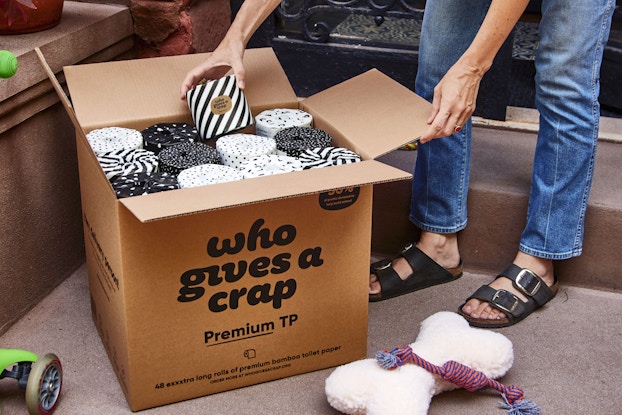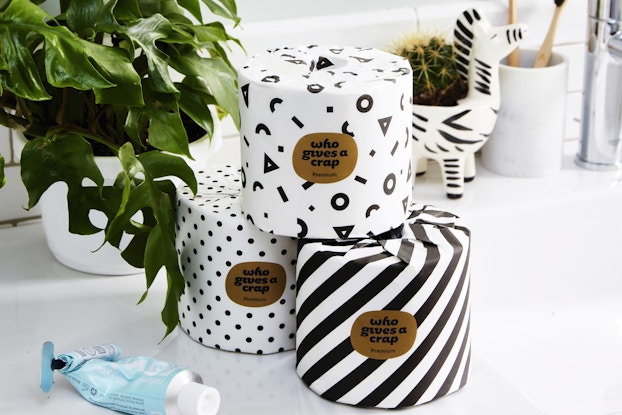
“All I want for Christmas is...toilet paper.”
Panic-buying of bathroom wipes continues unabated as the second (or third, depending on who you ask) wave of the pandemic continues to send COVID-19 infection rates soaring, while store shelves empty at a fast clip, as many retailers ration sales of their existing supply.
The holiday season commonly heralds the hottest new products from consumer electronics to toys and everything in between. But in a season and year like no other, shoppers are increasingly turning to basics and ordering them online. A survey of 1,000 consumers conducted by SAP revealed that 67% of buyers said they were planning to shop online for gifts and 16% said they were planning to give basics like hand sanitizer and toilet paper to friends and loved ones.
While companies like Winky Lux capitalized on the giftable hand sanitizer trend earlier this year, another global brand Who Gives a Crap (WGAC) has seen sales and profits skyrocket recently thanks to its premier product: sustainable toilet paper sold direct to consumers. A spike in sales in the spring ushered in brisk business throughout the summer. But now, just between November 13-16, sales have surged again over 100% in the U.S. alone. WGAC experienced similar rushes to buy toilet paper in Europe, Australia and the U.K., as well.
CO— Exclusives: Insider Strategies
How the buzziest brands and hottest startups are solving today's biggest business challenges. CO— brings you advice from startup founders and top executives for thriving in a new world.
Disrupting the toilet-paper market with bamboo and a social mission
This is all new for the company. When entrepreneurs Simon Griffiths, Jehan Ratnatunga and Danny Alexander launched the venture in 2012, they began with a simple promise to offer a more sustainable alternative to commercial brand toilet paper. Theirs would be made from recycled paper or eco-friendly bamboo; and in turn, WGAC would donate 50% of its profits to building toilets in emerging nations. The founders’ concern was that some two billion people worldwide don’t have access to proper toilets, and as many as 800 children alone die daily from diseases related to unsanitary conditions.
To raise the capital to get off the ground, Griffiths himself sat on his own toilet for 50 straight hours (no joke, there was a livestream as part of its IndieGoGo campaign). The stunt helped raise $50,000 and WGAC was able to roll out toilet paper deliveries in 2013.
Its sustainable business model designates WGAC as a Certified B Corporation, which means that it must continue to balance purpose and profit and has to maintain transparency of its supply chain, meet benchmarks for environmental sustainability and ensure that its labor practices are fair. WGAC’s co-founder and chief of product and purpose Danny Alexander told CO— that although the company has been bootstrapped for the entire time, “We essentially try to never not be profitable because we can't have an impact without making a profit.”
We essentially try to never not be profitable because we can't have an impact without making a profit.
Danny Alexander, co-founder and chief of product and purpose, Who Gives a Crap
A disruptor among disruptors: ‘At one point we were selling 28 rolls per second’
While WGAC was first among a flurry of more fancifully imagined DTC potty paper startups (others include Tushy, Cheeky Panda and Number Two) that aimed to disrupt heritage brands like Charmin, Cottonelle and even Unilever’s eco-minded Seventh Generation, its progress and profits were modest. Alexander said the company relied on word of mouth from existing customers and distributing to cafes where people would discover the toilet paper after a cup or three of coffee warranted a trip to the bathroom. Most buyers used the subscription model for restocking ease. As for price, 48 rolls of WGAC’s recycled paper comes in at a buck a roll, while the premium bamboo will set you back $52 for 48 rolls.
The brand might have continued to grow organically and turn a small profit — until 2020 began and upended everything.
“Back in March and April, we saw an 1,100% increase in demand,” Alexander recalled. “At one point we were selling 28 rolls of toilet paper per second.” After selling at that speed for a couple of days, the company just couldn't handle anymore. “So we ended up marking our website ‘sold out,’” he said. That’s when the brand started a digital sign up list for consumers who wanted to purchase once the stock became available. “Within a couple of weeks, we had over half a million people join our waiting list,” said Alexander.
Heightened product demand called for redistributing the goods to get as many orders satisfied as possible. So WGAC pivoted, directing each of its 10 warehouses to split packages of 48 rolls into two, while pushing its manufacturers in China to make as much as they could produce.
“But in that moment, we realized that we actually had an opportunity to help people through this really stressful time,” said Alexander. “So we took that responsibility pretty seriously.”
The funny factor: A bit of bathroom humor to tickle consumers
WGAC had always used bathroom humor to catch the eye of an unsuspecting consumer. It purchased a full-page ad in an Australian newspaper which noted that in case of an emergency, the reader could use the ad (made of recycled paper, just like WGAC TP!) to wipe their bottom. “We also shifted all of our email marketing and our social media to really be about helping people and still find reasons to smile in what was a really challenging period,” Alexander said.
Potty puns aside, WGAC also established a protocol to respond to thousands of emails requesting toilet paper for people in need like the 95-year old granny who couldn’t make it out to shop. “We also dedicated the first 10,000 or so rolls to be donated to charities in the U.S., U.K. and Australia,” he said. And while the company doesn’t reveal its actual sales figures, WGAC’s mounting donations to partner organizations that provide sanitation to vulnerable communities hint at the brand’s growth over the past few years. In 2013 the company donated $2,200 to partner organizations; so far in 2020, it’s donated over $4 million, up 700% from last year alone.

For his part, co-founder Simon Griffiths recognizes that barring another pandemic, the surprising increase in sales isn’t likely to last, especially if people start transitioning back to the workplace or toiling in coffee shops and don’t need as much toilet paper at home. But he’s confident that the brand stacks up against the competition both in terms of other DTC players and legacy retail brands.
“In this new world where more and more products do good, people can often buy products that align with their values but then find that they lose out on product quality, price or customer experience,” he said. “That will make them less likely to come back and buy again.” WGAC took pains to respond to customer requests in a timely fashion, which has turned many into devotees. But, Griffiths noted, what stands out is what the company continues to stand for.
The sustainable edge
Just as consumers increasingly turn to brands with eco-friendly bona fides, standards organizations are increasingly measuring brands for their sustainability, and toilet paper is no exception. Industry report “The Issue with Tissue” from The Natural Resources Defense Council (NRDC) contained a sustainability scorecard that gave some major brands a failing grade. Only two received an A+. WGAC scored the highest, with 495 points out of 500, in part because it uses either 100% recycled content or bamboo and is plastic-free, and also offers a donation program.
So, for now, the future looks as sparkly as a freshly scoured commode. The company seized the opportunity to expand its offerings to include paper towels ($16 for 6 double size rolls) and facial tissue ($16 for a dozen boxes).
“We’re excited that more people have had the opportunity to learn about us this year. Our focus now is all about welcoming these new folks into the fold and hoping they share a roll with their friends,” Alexander said. Paying it forward with paper during the holidays and beyond is what’s going to sustain this sustainable brand, he believes. “We’ve seen consistently that our customers are our greatest brand advocates.” And a little crappy humor adds to the fun, even after we emerge from these dark times.
CO— aims to bring you inspiration from leading respected experts. However, before making any business decision, you should consult a professional who can advise you based on your individual situation.
Follow us on Instagram for more expert tips & business owners stories.
CO—is committed to helping you start, run and grow your small business. Learn more about the benefits of small business membership in the U.S. Chamber of Commerce, here.







